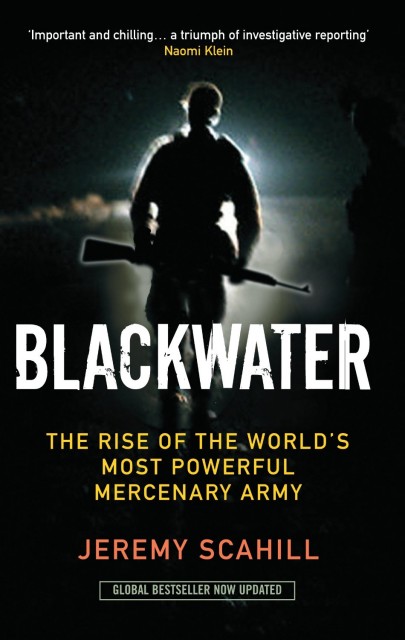
Blackwater: The Rise of the World’s Most Powerful Mercenary Army by Jeremy Scahill (2008 with 2013 epilogue) is an in-depth examination of the systematic privatization of the US military. In 1988, as Secretary of Defense to Bush senior, Dick Cheney initiated the process of outsourcing military training and security and intelligence roles to private companies. Thanks to Secretary of Defense Donald Rumsfeld and the Rumsfeld Doctrine, this outsourcing would extend to combat roles during the 2003-2008 occupation of Iraq.
Scahill’s book places special emphasis on the US failure to hold mercenary soldiers accountable for human rights violations. It also highlights the total absence of financial oversight, allowing Blackwater, Halliburton and other private military contractors to bilk taxpayers out of hundreds of billions of dollars. Finally it raises the troubling specter of corporations or even wealthy individuals hiring a standing mercenary army, such as Blackwater, to declare war against sovereign states.
Cheney Downsizes the US Military
Scahill begins by discussing the major downsizing of the US military that began in 1988, even before the fall of the Berlin Wall and break-up of the former Soviet Union. In his first year as Secretary of Defense, Cheney reduced military spending by $10 billion, by canceling expensive weapons systems and decreasing US troop strength from 2.2 to 1.6 million. As the cuts continued, there was a growing tendency to outsource various non-combat functions to private contractors. Clinton continued the trend, when he hired Military Professionals Resources Inc (staffed by retired military officers) to “train” the Croatian military* in their secessionist war against Serb-dominated Yugoslavia.
The Rumsfeld Doctrine
Following George W Bush’s election in 2000, Rumsfeld pursued even more aggressive privatization of the Pentagon bureaucracy. The primary neoconservative rationale for shifting both combat and non-combat duties to private mercenaries was to allow the President to engage in potentially unpopular overseas military interventions.
Other advantages included the ability of private mercenaries to engage in unlawful activities (such as extraordinary rendition**), for which regular forces would be subject to court martial under the Uniform Code of Military Justice – and a massive gravy train of unmonitored, no-bid contracts for wealthy Republican donors. In June 2004, after only fifteen months of US occupation, $9 billion of Iraqi reconstruction funds were unaccounted for.
The Blackwater Lodge and Training Center
Blackwater itself was first formed in 1996. It felled a big hole in training capacity, particularly in the Navy, resulting from Cheney’s extensive DOD cuts. Former Navy SEALS Erik Prince and Al Clark initially established the Blackwater Lodge and Training Center in North Carolina to offer private tactical training to Special Forces and local law enforcement personnel. A long time SEAL trainer, Clark supplied the concept. Prince, who came from a wealthy conservative Christian family, bankrolled it.
In 2002, Blackwater branched out into providing personnel as well as training. Their first contract would be to provide twenty security guards for Kabul’s CIA station in Afghanistan. In 2003, the State Department would award their largest documented (non-classified) contract providing security for US officials in Iraq. This included a $27.7 million no-bid contract to protect Paul Bremer. Bremer, who Bush appointed to run Iraq during the US occupation, quickly became the most hated man in Iraq.
Iraqi Resistance to Occupation
The book provides an interesting historical perspective on the rise of the Iraqi resistance movement in reaction to the virtual takeover of Iraq by US corporate interests. Contrary to the US media portrayal of the Iraqi opposition as al Qaeda terrorists, it was a genuine home grown movement which formed in reaction to Bremer’s refusal to allow free elections and his de-Baathification program. The latter instantly plunged the vast majority of Iraqis into abject misery. In addition to decommissioning 350,000 former Iraqi troops, it also threw hundreds of thousands of doctors, nurses, teachers, government workers out of work (who were required to join the Baath party as a condition of employment). The loss of these front line personnel would result in the total collapse of Iraqi society.
As Scahill carefully documents, the original Iraqi resistance was peaceful and nonviolent until the US military and Blackwater contractors deliberately fired on peaceful civilian protestors.
Blackwater and other mercenaries are typically paid $600-800 a day for mercenaries. This contrasts with an average of $270 a day for active duty GIs.
The Ambush in Fallujah
Blackwater devotes five chapters to the horrific ambush in Fallujah on March 30, 2004, in which a local mob killed, burned and dismembered four Blackwater contractors before hanging them from a bridge. It was this event that would bring Blackwater to world attention, while setting off a chain of events that would compel (due to an overstretched enlisted force) the Pentagon to hire Blackwater and other private security contractors* as mercenary soldiers in Iraq.
At a pay rate of $600-800 a day (in contrast to an average of $270 for active duty GIs), private security companies had no difficulty recruiting mercenaries. In fact, the worse the violence got, the more profits rolled in for Blackwater.
By June 2004, there were 20,000 private mercenaries in Iraq. By the time Rumsfeld resigned in 2006, there was a one to one ratio between troops and mercenary soldiers maintaining the US occupation in Iraq (100,000 mercenaries vs 100,000 troops).
In 2004-2005, the Blackwater role expanded to guarding the US oil industries pipeline in Kazakhstan and Azerbaijan, to “protecting” FEMA reconstruction contracts in New Orleans following Hurricane Katrina and to providing immigration security at the Mexican border. By 2007, Blackwater had 2300 private soldiers fighting in nine countries, as well as a database of 22,000 former troops, special forces operatives and retired law enforcement officers who could be deployed at short notice.
Immunity from Prosecution
As of 2013, when Scahill published the revised edition, no Blackwater contractors had ever been prosecuted for criminal human rights abuses. Under an edict Bremer enacted in 2004, US mercenaries were immune from prosecution under Iraqi law. Prosecuting them in American courts is extremely difficult owing to the difficulty of transporting foreign witnesses to the US. However in October 2014, a Washington DC federal district court found four of them guilty of murder and manslaughter for the 2007 shooting of seventeen civilians in Baghdad.
Erick Prince sold Blackwater in 2010 and it has since merged with its main rival Triple Canopy to form Academi. Although Blackwater was banned from Iraq in 2009, Academi still provides security for State Department personnel across many countries.They also continue to receive contracts from the Defense Department and US intelligence agencies.
Links to free epub and kindle versions of Blackwater are available at Blackwater the Rise of the World’s Most Powerful Mercenary Army
*In the mid-1990s, the Croatian military was dominated by right-wing Nazi sympathizers similar to those in the present Ukrainian government.
** Extraordinary or irregular rendition is the US sponsored abduction and extrajudicial transfer of a person to countries known to practice torture. It’s also known as torture by proxy.
***Other companies that entered the lucrative mercenary market in 2004 include Control Risks Group, DynCorp, Erinys, Algis, Armor Group, Hart, Kroll and Steele Foundation. British security contractors were also extremely pro-active in Iraq. By October 2006, there were 21,000 British mercenaries in Iraq, in contrast with 7.200 conventional duty troops.
Dr. Bramhall is a retired American child and adolescent psychiatrist, activist and political refugee in New Zealand.
Her first book The Most Revolutionary Act: Memoir of an American Refugee describes the circumstances that led her to leave the US in 2002. She has also published two young adult novels about political activism: The Battle for Tomorrow: A Fable
View All Books by Dr. Bramhall >>>
She is involved in the national leadership of the New Zealand Green Party and has a political blog at StuartJeanneBramhall.com
ATTENTION READERS
We See The World From All Sides and Want YOU To Be Fully InformedIn fact, intentional disinformation is a disgraceful scourge in media today. So to assuage any possible errant incorrect information posted herein, we strongly encourage you to seek corroboration from other non-VT sources before forming an educated opinion.
About VT - Policies & Disclosures - Comment Policy



